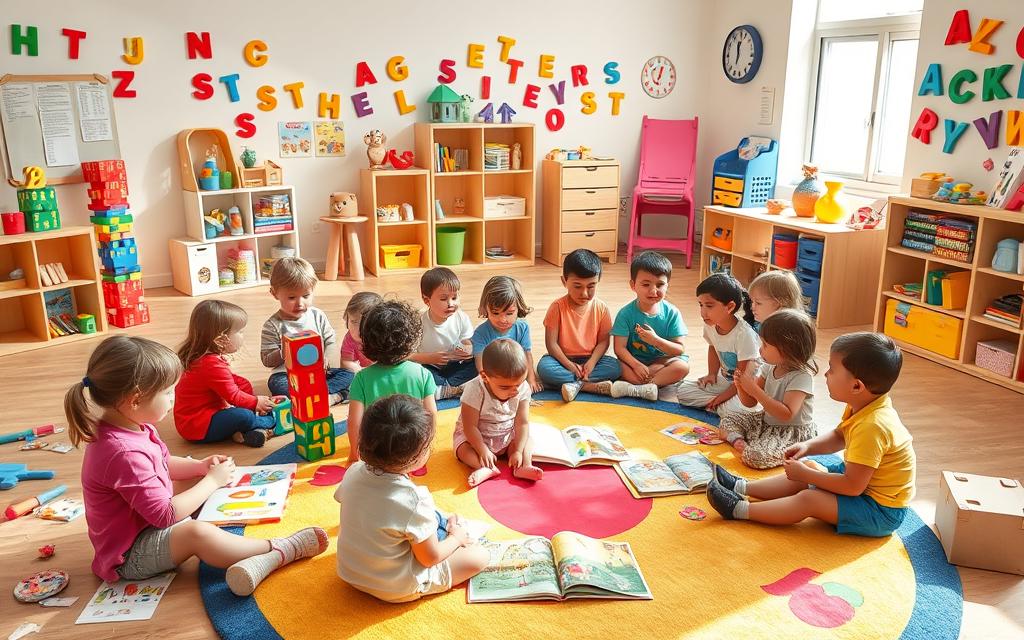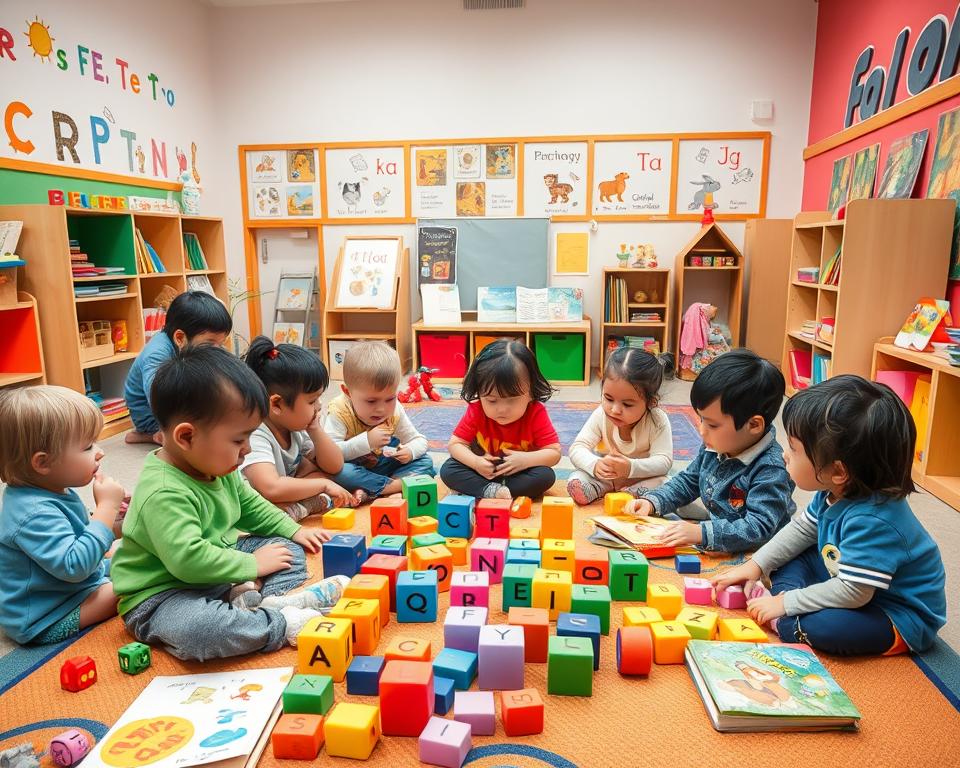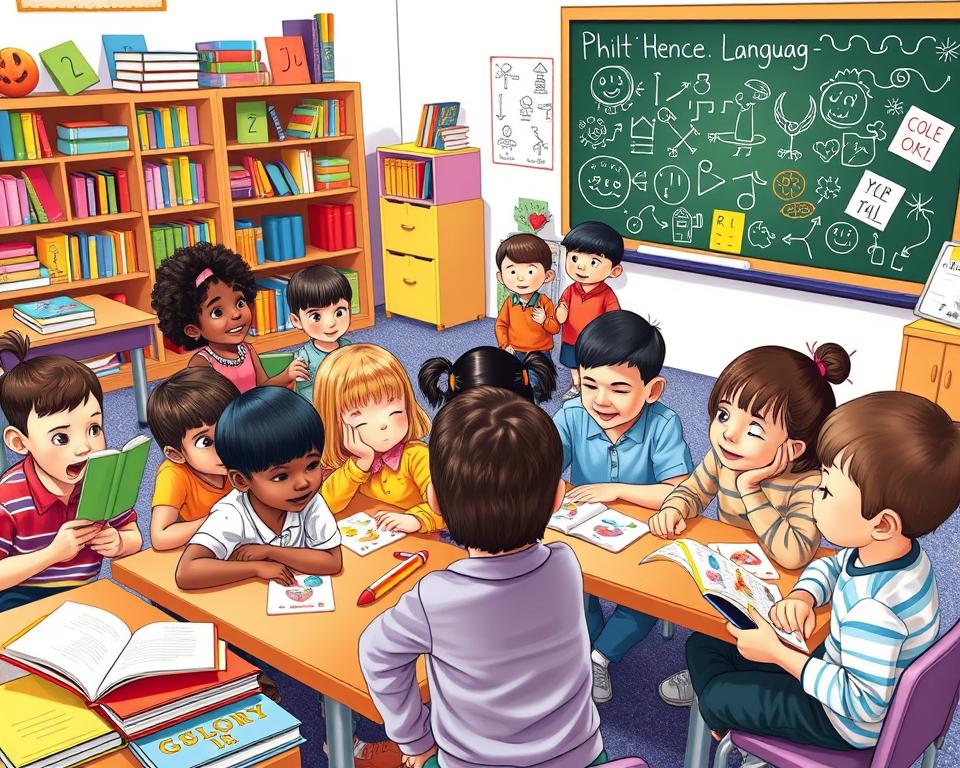Did you know kids start learning language from birth? Early sounds like cooing are key for language growth. Fun language activities for preschoolers help them learn and talk better.
Play and talk are great ways for kids to learn new words. This makes learning fun and helps them grow their vocabulary. Parents should offer lots of playful ways to help kids speak and understand better.
Understand the Importance of Language Development in Early Childhood
Language development is key in early childhood, setting the stage for future learning. Preschool language development helps kids talk, connect, and share their feelings. Fun language exercises for kids boost communication, thinking, and social skills.
It’s vital to make a place where kids can learn language well. Reading, singing, and telling stories are great ways to do this. These activities help kids grow strong in language, which is crucial for school and social life.
Key Developmental Milestones
Children hit language milestones like babbling and speaking early in life. These signs show how well a child is doing with language. They also help spot any language problems or delays.
Infancy (0-12 Months)
- Cooing and Babbling: Babies begin experimenting with sounds around 6-8 weeks.
- Recognizing Words: By 6 months, infants start associating words with meanings.
- First Words: Around their first birthday, many children utter their first words.
Toddlerhood (1-3 Years)
- Vocabulary Explosion: Toddlers learn new words rapidly, reaching approximately 200-300 words by age 2.
- Combining Words: Simple two-word sentences, like “want cookie,” appear by age 2.
- Understanding Commands: Comprehension of basic instructions increases significantly.
Preschool Years (3-5 Years)
- Complex Sentences: Preschoolers construct longer, more complex sentences.
- Narrative Skills: By age 4, they can recount simple stories.
- Expanding Vocabulary: Vocabulary grows to approximately 1,500-2,000 words by age 5.
Benefits of Early Language Activities
Starting early with language learning activities can greatly help a child. It improves talking, thinking, and social skills. These skills are important for school and making friends.
Cognitive Development
Early language activities stimulate brain development, improving memory, attention, and problem-solving skills.
Academic Readiness
Strong language skills are directly linked to success in reading, writing, and overall academic achievement.
Social-Emotional Growth
Language enhances a child’s ability to express emotions, resolve conflicts, and build relationships.
Cultural Understanding
Exposure to diverse languages and cultures fosters inclusivity and empathy.
Create a Language-Rich Environment
It’s important to make a place where kids can learn language well. Reading, singing, and storytelling are great ways to do this. By doing these activities, kids can develop strong language skills and a love for learning.
1. Engage in Conversations
Talk with children regularly, using rich vocabulary and responsive dialogue. Ask open-ended questions to encourage participation.
2. Read Aloud Daily
Reading books aloud introduces children to new words, sentence structures, and storytelling techniques.
3. Incorporate Music and Rhymes
Songs and nursery rhymes make language learning fun and memorable while improving phonological awareness.
4. Provide Varied Language Materials
Offer books, flashcards, and educational toys that stimulate curiosity and learning.
5. Limit Screen Time
Encourage interactive language use rather than passive consumption of media.
6. Foster Peer Interaction
Facilitate playdates or group activities that promote social communication.
7. Model Proper Language Use
Use correct grammar and pronunciation to set a strong example for children.
Understanding and nurturing language development in early childhood is critical for lifelong success. By recognizing key developmental milestones, leveraging the benefits of early language activities, and creating a language-rich environment, parents and educators can empower children to thrive academically, socially, and emotionally.
Essential Language Activities for Preschoolers: Setting the Foundation
Language activities for preschoolers are key to building a strong language base. They help improve vocabulary and understanding. Studies show that kids who do these activities learn 30% more words than those who don’t.
Important activities include practicing turn-taking and using a DIY telephone. They help kids listen, speak, and understand better. Language activities for early childhood should be fun and engaging, making learning a joy for young ones.
Some examples of language activities for preschoolers include:
- Engaging in storytelling and picture book adventures to improve narrative skills and comprehension
- Participating in word family recognition games to increase early reading success
- Playing sound bingo to improve phonemic awareness
By adding these activities to their daily routine, preschoolers can build a solid language foundation. Creative language activities can be customized for each child, making learning a fun and personal journey.
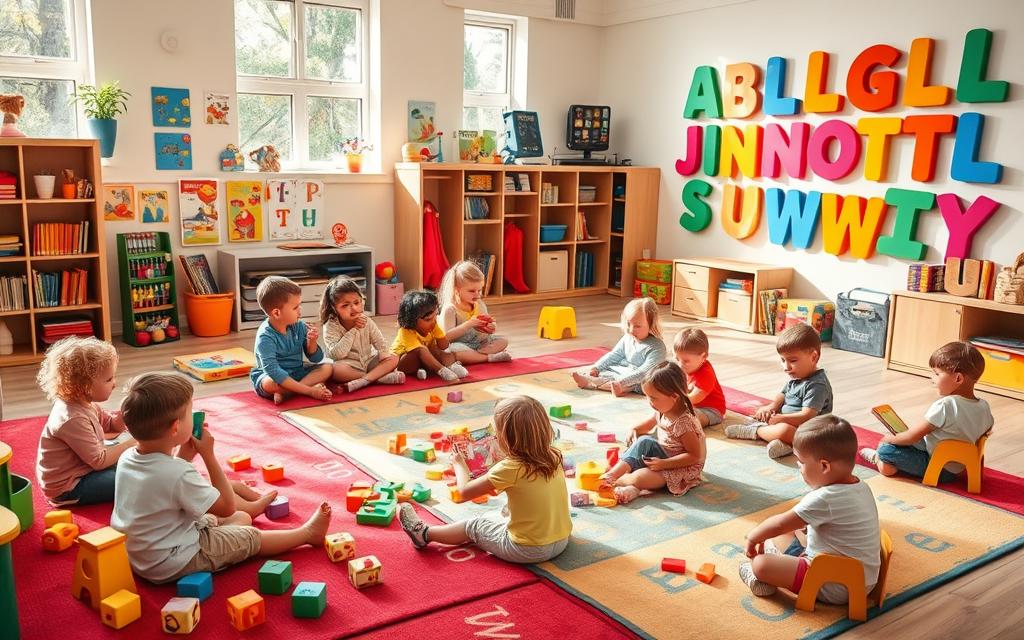
Here are some essential language activities that can help set the foundation for effective language development in preschoolers:
1. Reading Aloud: Reading aloud to preschoolers is one of the most effective ways to promote language development. Choose age-appropriate books with colorful illustrations and engaging stories to capture their attention. By exposing children to a variety of vocabulary and sentence structures through reading, you are helping them expand their language skills.
2. Singing Songs and Nursery Rhymes: Music is a powerful tool for language development. Singing songs and reciting nursery rhymes helps children develop their phonological awareness, which is essential for reading and writing. In addition, music also helps children remember words and improve their memory skills.
3. Engaging in Conversations: Encourage preschoolers to engage in conversations by asking open-ended questions and actively listening to their responses. By fostering communication skills through conversations, children learn to express themselves effectively and develop their vocabulary.
4. Playing with Language: Encourage preschoolers to play with language by engaging in activities such as rhyming games, word games, and storytelling. By exploring the playful side of language, children develop a love for words and communication.
5. Exposing to Different Languages: Introducing preschoolers to different languages can also have a positive impact on their language development. Exposing children to multicultural experiences helps them appreciate diversity and learn new words and phrases from different languages.
6. Creating a Language-Rich Environment: Lastly, creating a language-rich environment at home or in the classroom is essential for preschoolers’ language development. Displaying words, labels, and pictures around the environment helps children make connections between spoken and written language.
Thus, setting the foundation for effective language development in preschoolers requires a holistic approach that includes reading aloud, singing songs, engaging in conversations, playing with language, exposing to different languages, and creating a language-rich environment. By incorporating these essential language activities into daily routines, parents and educators can help preschoolers build a strong linguistic foundation that will benefit them throughout their lives.
Storytelling and Picture Book Adventures
Interactive language games and educational play are key for preschoolers. Storytelling and picture books are great for their language skills. They help kids use their imagination and speak better. Reading aloud and asking questions improve listening and understanding.
Activities like creating stories with puppets and sequencing pictures are fun. They help kids think critically and grasp story structure. By making these games part of daily life, parents and teachers help kids build a strong language base.
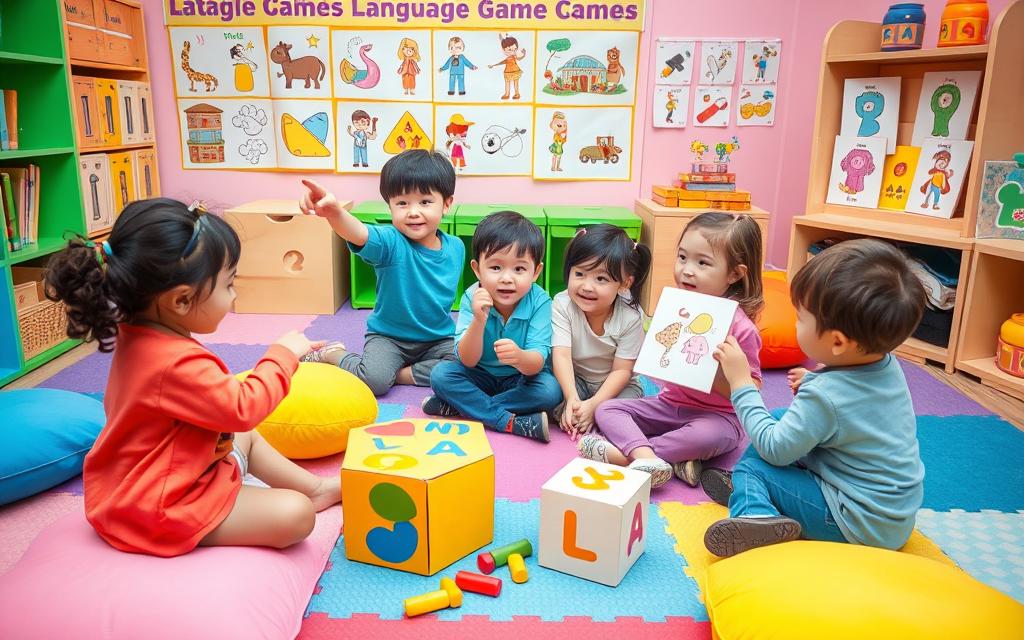
Storytelling boosts kids’ creativity, social skills, and emotional smarts. Using props and puppets makes learning language fun. Dress-up and puppets keep kids focused and interested, helping them stay engaged longer.
Musical Language Learning Games
Music is a great way to help preschoolers learn new languages. Language learning activities like singing and reciting rhymes boost their language skills. These fun activities can be part of their daily routine, making learning a breeze.
Here are some musical games that help with language:
- Musical statues improve spatial skills and rhythm
- Dancing with props teaches sharing and self-expression
- Exploring musical moods helps with empathy and communication
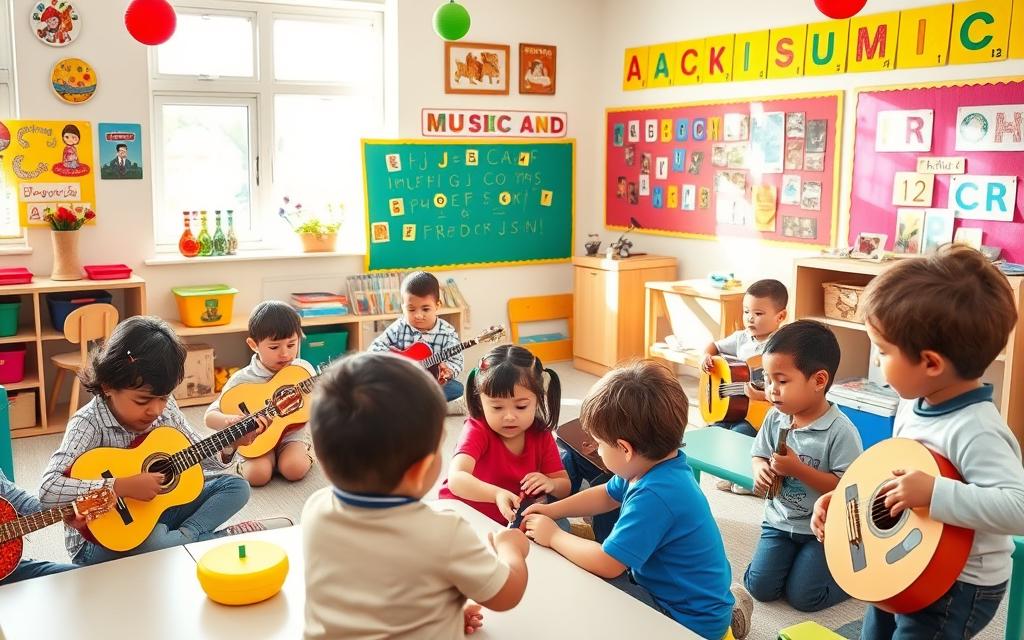
Language activities for early childhood get a boost from music and movement. Games like “follow the leader” and “drawing what you hear” mix sound with creativity. Creative language activities like making drums and playing rhythm sticks enhance rhythm and spatial awareness.
Studies show music helps kids a lot, especially with language and reading. By adding music to language learning activities, preschoolers get better at thinking and learning. This sets them up for success in school.
Role-Play and Dramatic Play for Language Enhancement
Role-playing and dramatic play are key for preschoolers’ growth. They boost cognitive, emotional, and social skills. These activities improve speaking and listening, making kids more confident and skilled in communication.
Children learn new words through pretend play. They use these words in real-life scenarios. This way, they remember and use language better.
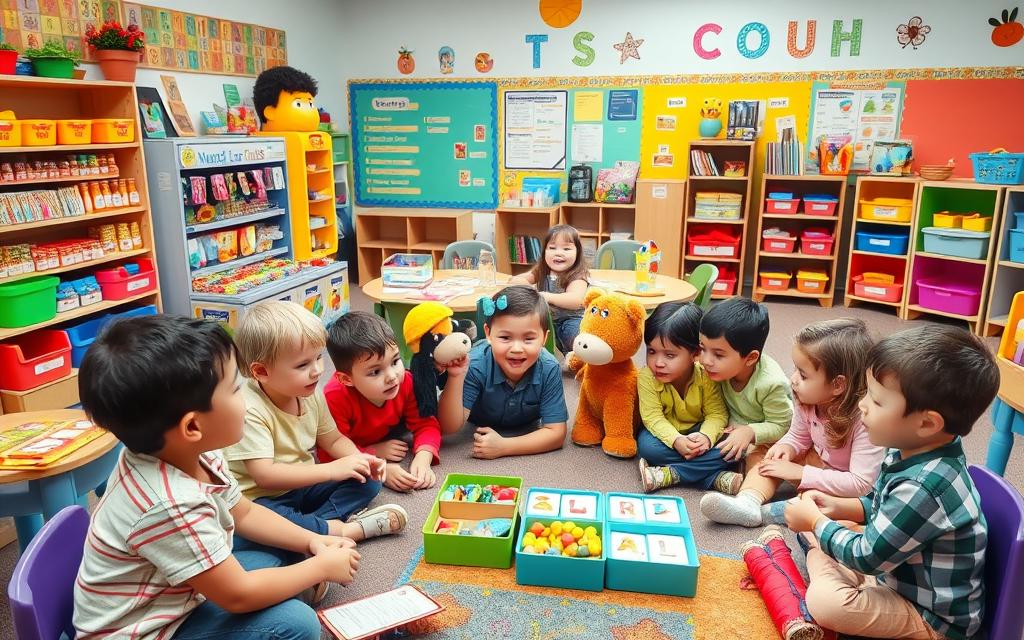
Dramatic play has many benefits. It helps kids control their emotions, focus better, and think critically. It also teaches social skills like sharing and working together.
Here are some examples of dramatic play scenarios:
- Role Play: Kids take on roles like “teacher,” “firefighter,” or “parent.”
- Fantasy Play: They explore imaginative worlds, like being superheroes or space explorers.
- Object Play: They use everyday items to act out other roles (like using spoons as phones).
These scenarios help kids grow their language skills. They also encourage creativity, imagination, and teamwork.
Sensory-Based Communication Exercises
Using sensory experiences in language learning can really help preschoolers. Activities like sensory bins, playdough, and sand improve fine motor skills and hand-eye coordination. These are key for writing and reading. They also teach vocabulary and grammar, making them great for language learning.
Some examples of sensory-based communication exercises include:
- Sensory bins filled with rice, beans, or sand, which can help children develop their tactile awareness and fine motor skills
- Playdough, which can be used to create shapes and objects, promoting creativity and language development
- Sand, which can be used to create letters and words, practicing writing and reading skills
These activities can be customized for each child. They can fit different themes and topics. For instance, a rice bin with small toys can teach animal vocabulary. Playdough can practice shapes and colors. Sensory exercises help preschoolers build a strong language foundation, preparing them for school and social life.
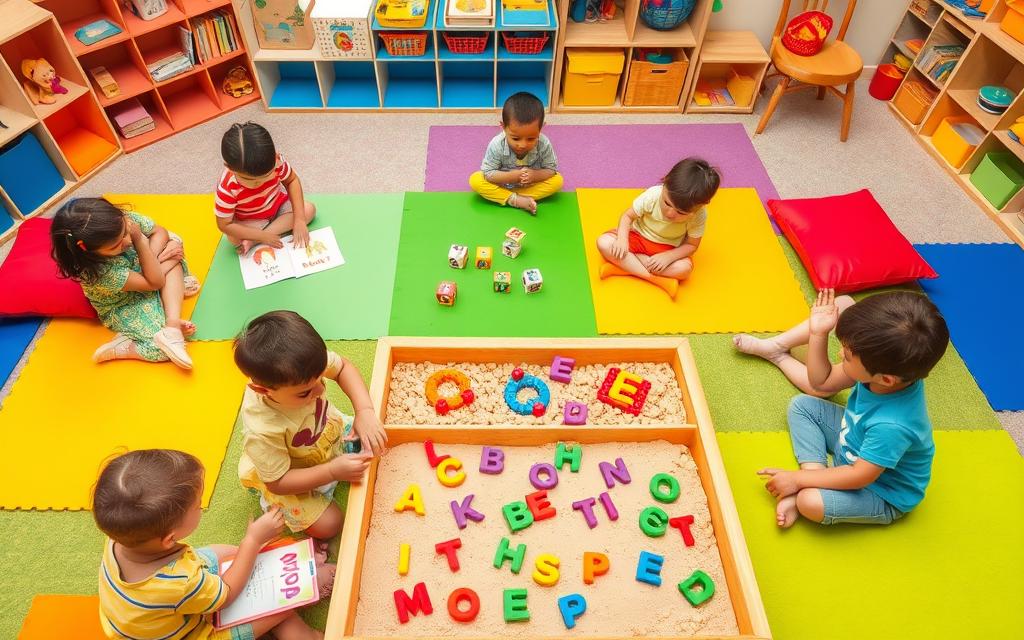
Using materials like playdough, sand, or textured objects helps children with speech delays. It also aids those with sensory processing issues. These activities make learning fun and engaging, helping preschoolers develop essential language skills.
Build Vocabulary Through Movement and Action
Language activities for preschoolers can be more fun with movement and action. This method helps kids learn new words and understand action verbs. Games like charades teach words like “run,” “jump,” and “dance.” These games are great for learning language and staying active.
Studies show that kids who move learn more words and understand sentences better. The American Academy of Pediatrics says play and movement are key for kids to grow well. By adding movement to language lessons, teachers can make learning fun and help kids grow physically and linguistically.
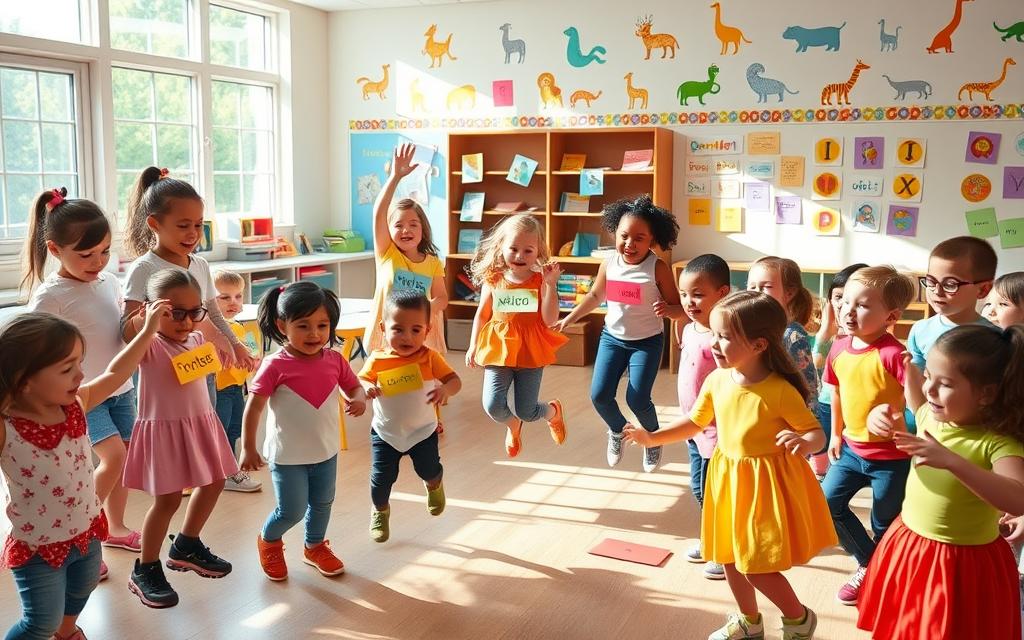
Action Word Games
Action word games are a fun way to learn new words through movement. These games can be played in many places, like classrooms and parks. Here are some examples:
- Simon Says: This game teaches kids to follow directions and learn words like “touch,” “jump,” and “clap.”
- Red Light, Green Light: This game gets kids moving and teaches them to understand words like “run,” “stop,” and “go.”
- Freeze Dance: This game helps kids learn words like “dance,” “freeze,” and “move.”
Physical Language Challenges
Physical language challenges are another way to learn new words through movement. These challenges help kids understand and use action words in real situations. Here are some examples:
Obstacle courses, balance beams, and ball games teach kids words like “run,” “jump,” “throw,” and “catch.” These challenges are great for learning language and staying active.
Creative Arts and Language Expression
Engaging in creative arts is key for preschoolers’ language growth. It boosts confidence, imagination, and social skills. Language learning activities like drawing, painting, and crafting improve fine motor skills and hand-eye coordination. These are vital for writing and reading.
Creative arts also teach vocabulary and grammar. They are a great fit for any language activities for early childhood program.
Some benefits of creative arts include:
- Improving emotional expression and building vocabulary
- Enhancing linguistic skills and understanding emotions
- Developing problem-solving and decision-making skills
- Encouraging imagination and empathy through play-based learning activities
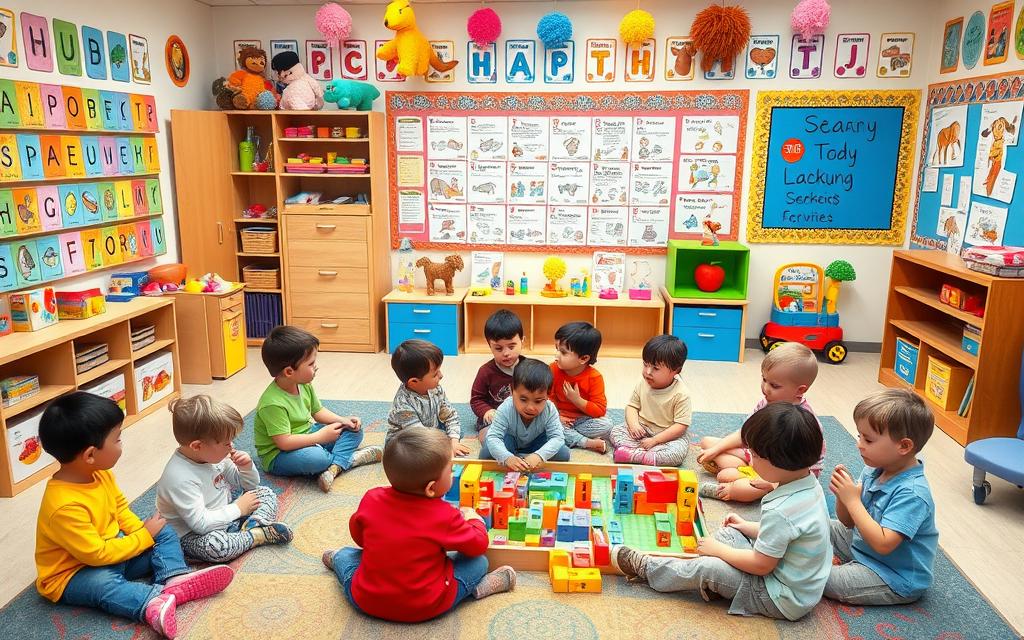
Research shows that 65-75% of preschoolers love songs with simple lyrics and tunes. This helps with language acquisition and recognizing sound patterns. Creative language activities like puppetry and storytelling spark imagination and empathy. They help preschoolers act out roles.
By using various materials and activities, preschoolers grow their creativity and imagination. This leads to deeper learning.
Nurture Language Skills Through Play
Nurturing language skills through play is key in early childhood education. This article has shown how engaging activities can boost language development in young ones. By adding these activities to daily routines, parents and teachers can create a rich language environment. This supports children’s growth and prepares them for school success.
Studies highlight the importance of language and literacy in early learning. They are essential for lifelong skills. Interactive games and educational play can greatly improve a child’s vocabulary and communication. Play helps preschoolers grasp language, while also boosting creativity and social skills.
Engaging in interactive play helps unlock possibilities for young learners. As children explore language through play, they improve communication and develop a love for learning. Embrace language-rich play to see your preschooler’s language skills grow.
Language Activities for Preschoolers
Classroom Activities for Teachers
- Storytelling Circles: Encourage children to create and narrate their own stories.
- Alphabet Treasure Hunt: Hide objects around the room starting with different letters.
- Puppet Shows: Use puppets to act out stories and engage children in dialogue.
- Word Matching Games: Match pictures to corresponding words.
- Sing-Along Sessions: Teach songs with repetitive and rhyming words.
- Interactive Storytime: Pause during readings to ask predictive questions.
- Name Recognition Games: Help children recognize and spell their names.
- Language Bingo: Use vocabulary themes like animals or colors.
- Word Walls: Display words and encourage children to use them in sentences.
- Role-Playing Scenarios: Create real-life situations, such as shopping or dining.
- Rhyme Time: Identify rhyming words in songs or stories.
- Show and Tell: Encourage children to describe their favorite items.
- Sound Games: Identify beginning sounds of words.
- Daily News Sharing: Let children share one thing they did the previous day.
- Picture Description: Show a picture and ask children to describe what they see.
- Group Story Creation: Build a story collectively, with each child contributing a line.
- Vocabulary Jar: Introduce a new word daily from a jar.
- Flashcard Drills: Use colorful flashcards for vocabulary practice.
- Listening Games: Follow multi-step instructions.
- Labeling the Classroom: Place labels on objects to enhance word recognition.
Homeschool Activities for Parents
- Daily Reading Routine: Read books together every day.
- Nature Walk Conversations: Discuss objects and creatures seen during walks.
- Cooking Together: Name ingredients and actions while preparing food.
- Shopping Lists: Create and read shopping lists together.
- Homemade Flashcards: Craft flashcards with pictures and words.
- Sing Favorite Songs: Sing nursery rhymes and simple songs.
- Craft Storyboards: Draw scenes and create a story around them.
- Alphabet Sorting: Organize objects by their starting letters.
- Rhyming Word Hunt: Find rhyming pairs around the house.
- Picture Book Exploration: Discuss illustrations in detail.
- Journaling: Help children write or draw about their day.
- Create a Word Jar: Introduce new words and discuss their meanings.
- Act Out Stories: Perform scenes from favorite books.
- DIY Puppet Shows: Make puppets and perform dialogues.
- Counting Games: Use numbers and words in playful activities.
- Story Retelling: Ask children to retell stories in their own words.
- Sorting by Category: Sort objects by color, size, or use while naming them.
- Interactive Questions: Pose “what if” or “how” questions during playtime.
- Build a Vocabulary Tree: Add new words to a paper tree on the wall.
- Language Apps: Use child-friendly apps to supplement learning.
Understanding and nurturing language development in early childhood is critical for lifelong success. By recognizing key developmental milestones, leveraging the benefits of early language activities, and creating a language-rich environment, parents and educators can empower children to thrive academically, socially, and emotionally.
Key Takeaways
- Engaging in language activities for preschoolers can significantly boost their vocabulary and communication skills.
- Interactive language games and educational language play are essential for language development in early childhood.
- Activities such as storytelling, baking, and musical play can provide linguistic opportunities.
- Engaging in play and conversation increases the number of words a child hears, positively influencing vocabulary growth and complexity.
- Parents are encouraged to provide numerous forms of playful communication activities to help develop speech and language.
- Language activities for preschoolers can include interactive reading, sensory play, and role-playing with dressing-up clothes.
- Quality screen time, when shared with caregivers, can also support learning and language development.
Source Links
- The 15 Best Language Activities for Preschoolers – Empowered Parents – https://empoweredparents.co/language-activities-for-preschoolers/
- Language and play: preschoolers – https://raisingchildren.net.au/preschoolers/play-learning/play-preschooler-development/talking-play-preschoolers
- No title found – https://www.funfoxprogram.com.au/blog/language-activities-for-toddlers
- Importance of Language Development in Early Childhood – https://tessais.org/why-is-language-important-for-childrens-learning/
- Preschoolers’ play at home and school as a natural contributor to early literacy and language development | Encyclopedia on Early Childhood Development – https://www.child-encyclopedia.com/language-development-and-literacy/according-experts/preschoolers-play-home-and-school-natural
- Early Intervention in Language Development – https://web.teachtown.com/blog/the-importance-of-intervening-early-in-language-development/
- 20 Best Language and Literacy Activities for Preschoolers – https://blog.acceleratelearning.com/20-best-language-and-literacy-activities-for-preschoolers
- 10 EYFS communication and language activities | Famly – https://www.famly.co/blog/10-simple-communication-and-language-activities
- Unlock Engaging Language and Literacy Activities for Preschoolers – https://www.vancopayments.com/child-care/blog/literacy-activities-for-preschoolers
- Best Creative Storytelling Activities for Kids in 2024 — Shir Hashirim | Montessori School – https://www.montessorihollywood.org/blog/best-storytelling-activities
- 25 Book Activities For Preschoolers – Little Bins for Little Hands – https://littlebinsforlittlehands.com/30-book-activities-hands-on-learning-literacy-play/
- 11 Best Storytelling Activities for Kids in 2025 – https://www.splashlearn.com/blog/best-storytelling-activities-for-kids/
- 10 music and movement activities for preschoolers | Famly – https://www.famly.co/us/blog/music-and-movement-activities
- Music and Movement Activities for Preschool – https://www.digthegoodlife.com/music-and-movement-activities-for-preschool/
- 24 Dramatic Play Ideas for Toddlers and Preschoolers | XIHA Montessori – https://xihamontessori.com/dramatic-play-ideas/
- The Best Dramatic Play Ideas for Pre-Schoolers at Home — Educator Mom Hub | Supporting Moms of Young Children – https://www.educatormomhub.com/blog/dramatic-play-ideas-preschool
- Fun Drama Games to Boost Language Skills in Young Children: Engaging Activities for Early Learners – Kangaroo Kids – https://www.kangarookids.in/blog/fun-drama-games-to-boost-language-skills-in-young-children/
- The Best Speech Therapy Activities for Preschoolers – https://www.primarybeginnings.com/blog/speech-therapy-activities-for-preschoolers
- 12 Joyful Sensory Activities for Kids – https://www.skillpointtherapy.com/12-joyful-sensory-activities-for-kids/
- Speech Magic: Fun Therapy Activities for Preschoolers – https://www.mywellnesshub.in/blog/speech-magic-fun-therapy-activities-for-preschoolers/
- 31 Fun & Interactive Circle Time Activities for Preschoolers – https://www.vancopayments.com/child-care/blog/circle-time-activities-for-preschoolers
- Creative Movement Exercises for Better Speech Development – https://www.mywellnesshub.in/blog/exercises-for-better-speech-development/
- Creative activities for preschooler learning and development – https://raisingchildren.net.au/preschoolers/development/creative-development/preschooler-creative-activities
- 15 exciting expressive arts and design EYFS activities – Blossom Educational – https://blossomeducational.com/blog/15-exciting-expressive-arts-and-design-eyfs-activities/
- Art activities for kids: Using creativity to express emotions – https://huckleberrycare.com/blog/art-activities-for-kids-using-creativity-to-express-emotions
- Little Explorers – Unleashing the Power of Language – https://littleexplorers.education/blog/unleashing-the-power-of-language.php
- Best Activities for Supporting Language Development – https://www.mywellnesshub.in/blog/effective-language-development-activities/
- 10 games and activities that can help develop language skills in preschoolers – little green house – https://littlegreenhouse.com.sg/10-games-and-activities-that-can-help-develop-language-skills-in-preschoolers/

